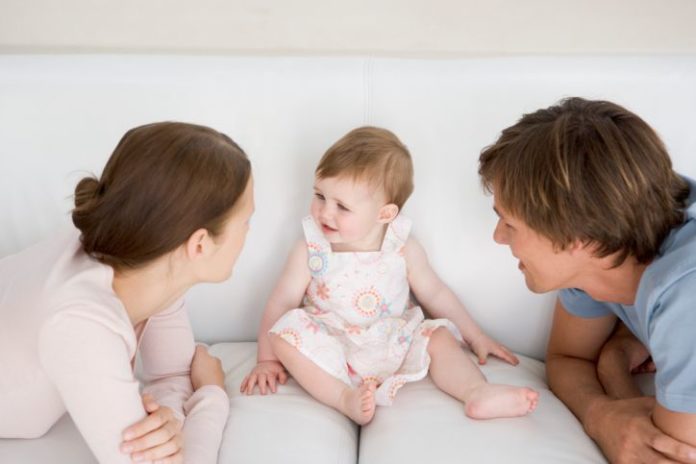When a baby has a cold they will need plenty of love and support, and you may need to relieve some of their symptoms with simple baby cold remedies. While you give your baby love and support every day, it may be a bit more challenging and stressful during a cold.
Keep your 3-12 month old baby comfortable
While you’re giving them plenty of love, remember to keep them comfortable.
Don’t smoke
It’s important not to smoke around your baby at any time, but this is even more important when baby has a cold. The smoke from cigarettes is irritating and can make a blocked nose or sore throat even worse.
Keep baby warm but don’t overheat
When baby is sick with a cold, remember that being cold does not cause colds. It follows that keeping baby warm or putting on extra clothes won’t prevent a cold or make it go away any quicker. However, parents often put extra clothes or blankets on their baby when they have a cold. This not only won’t help, but overheating can be dangerous for a baby. Being too hot while asleep is associated with sudden infant death syndrome (SIDS).
Dress your baby in clothes suitable for preventing them from becoming chilled in the weather. Obviously, if it’s summer appropriate attire will be different to winter. If you’re inside and the room is heated, the types of clothes your baby needs to wear will be different compared to if you are going outside in the cold. Check your baby’s temperature by feeling the skin of their chest – if it is very warm you may need to remove clothes. If your baby is sweating or has a red face it’s also a sign that you need to take some clothes or blankets off. Only put on extra clothes if the skin on their chest is cool to touch – cold hands or feet do not mean they need extra clothes.
Don’t use an electric blanket or hot water bottle. Don’t overheat their room or the house to try and warm them up. There is no need to leave the heater on all night. Don’t cover their face or head to keep them warm – babies regulate their temperature by letting heat escape from their heads and this is a normal and healthy way of keeping their bodies at the right temperature.
Soothing baby baths
A bath may be a good way to soothe your baby if they are upset by flu symptoms; although some babies like baths more than others and if your baby tenses up, a bath might not be the right thing for them. Babies who enjoy taking a bath might enjoy it even more if you add some toys to the bath for them to play with. But don’t leave them alone to play. You need to supervise your baby at all times when they’re in the bath.
Soothing and comforting your 3-12 month old baby during a cold
 Babies tend to cry a lot at the best of times, but when they are affected by annoying and uncomfortable conditions like a common cold, they’ll cry even more. Crying is simply a baby’s way of trying to tell you something, for example that they are hungry or uncomfortable. And with a snotty nose or sore throat, they will be uncomfortable a lot more often than usual and cry more. Even though it’s normal, it can be very distressing to hear your baby crying. You’ll want to do everything you can to comfort baby, and make sure you don’t do anything to make their crying worse.
Babies tend to cry a lot at the best of times, but when they are affected by annoying and uncomfortable conditions like a common cold, they’ll cry even more. Crying is simply a baby’s way of trying to tell you something, for example that they are hungry or uncomfortable. And with a snotty nose or sore throat, they will be uncomfortable a lot more often than usual and cry more. Even though it’s normal, it can be very distressing to hear your baby crying. You’ll want to do everything you can to comfort baby, and make sure you don’t do anything to make their crying worse.
Calm yourself down
Start by taking a deep breath, reminding yourself that crying is normal and not a sign that you’ve failed as a parent. If you’re all wound up your baby will sense that, and it’s likely to make them cry even more. So breathe, calm yourself down and let your baby know that you’re there to help them calm down and you’re not going to get stressed out about it.
Rule out the common causes of baby tears
Next check that they are not hungry or uncomfortable, for example because they are too hot or cold or their nappy is wet – these are common causes of baby tears. But if their nappy is dry and baby’s not hungry, it’s a fairly safe bet they’re crying because their cold symptoms are making them uncomfortable.
Give them some extra TLC
You can’t make their cold magically disappear but you can let them know you’re there to support them and love them until they get better. Lay a bit of extra TLC on your baby – they will probably want lots of cuddles and soothing touches. Experiment with different positions, for example lying baby on its tummy across your lap or rocking baby in your arms while you walk around. Music may help your baby relax but this is not the time to introduce your favourite rock band – playing relaxing music is more likely to soothe and calm your baby. Massaging your baby’s tummy can also help soothe them – place your hand on their tummy and press gently but firmly as you make circular motions over baby’s tummy.
Distract them
Placing a toy in front of baby’s face to distract them from crying might work, particularly for older babies who are more aware of what’s going on around them. It may be difficult to distract them from uncomfortable cold symptoms, so choose a favourite toy or something your baby really likes. Getting out of the house might also be a good idea – put baby in the stroller and take a walk in the park or somewhere else you can relax and cope with it all. If nothing seems to work and you just can’t get baby to settle, it’s time for some professional support from your doctor.
Stay calm and get support
If your baby won’t settle no matter what you do, you’ll probably start to get stressed out. It’s hard not to, but this is actually the worst thing you can do. Take a deep breath and count to ten. Tell yourself to keep calm. If there is something that helps you to relax like playing music, do that. If someone else is around and can cuddle baby while you have a short break, make the most of it.
Deciding if your baby should go to childcare
When a baby is sick, parents need to decide whether or not it is worth them staying home, or if it’s okay for them to go to childcare. Colds are contagious and can spread even before the symptoms start, so keeping them at home won’t really help when it comes to preventing the spread of their germs. As a general rule, if your baby has a fever or other severe symptoms, keep them at home. If they are recovering and generally coping with their symptoms and ready to play, talk to your childcare provider before sending them and see what they think.
Childcare is often a necessity rather than a choice and keeping baby at home might not be as easy as that if you are a single parent or you and your partner both work. It’s a good idea to try and plan in advance what you can do if your baby is so sick they can’t go to daycare (e.g. a friend or relative who can help, or teach somebody else to do your job while you are away).
Keep your 3-12 month old baby well nourished
 Being well nourished will help a baby recover from a cold, but it may be difficult to keep them eating and drinking while they’re sick. It’s particularly important to give your baby plenty of breastmilk (or substitute) and water to prevent dehydration. You do not need to give extra fluids; try to ensure your baby drinks the same amount of breastmilk or other fluid as they usually do.
Being well nourished will help a baby recover from a cold, but it may be difficult to keep them eating and drinking while they’re sick. It’s particularly important to give your baby plenty of breastmilk (or substitute) and water to prevent dehydration. You do not need to give extra fluids; try to ensure your baby drinks the same amount of breastmilk or other fluid as they usually do.
You may need to feed your baby more often than usual as they will most likely eat less because their blocked nose makes feeding difficult. This is because babies only breathe through their nose (they have not yet started breathing through their mouths like adults). Breathing might therefore be difficult during suckling.
If you can’t get your baby to feed as much as they usually do, don’t worry too much. It’s not unusual for a cold to interrupt feeding and your baby may even stop gaining weight for a week or two. If your baby seems otherwise healthy, it’s usually best just to wait and see. It’s usually only temporary if a baby stops gaining weight during a cold.
But if you are concerned that your baby does not eat as much as they usually do,or if your baby is not nursing or drinking fluids, you should visit a doctor.
Distract your 3-12 month old baby with activities
Games and outings might provide a good distraction from uncomfortable cold symptoms. Doing activities in the day stimulates your baby and that can make it easier to get to sleep at night. Just talking with your baby or singing and playing games is enough to stimulate them. Unless the weather is very cold, there is no reason to keep baby indoors. So make sure they’re dressed appropriately for the weather and get out of the house for a while. You could visit the local park or wander some quiet streets.
References
- Farrer Cold and flu in Children. South African Pharmacists Assistant. 2013; 13(1): 16-17. Available from: (URL Link)
- Shields MD, Bush A, Everard ML, et al. Recommendations for the assessment and management of cough in children. Thorax. 2008; S3: 1-15. Available from: (URL Link)
- Mayo Clinic. Guide to your baby’s first year. Good Books. Intercourse, United States. (Full text).
- SIDS and KIDS. Information Statement- Room Temperature. 2010. (cited 25 May 2013). Available from: (URL Link)
- Sydney Children’s Hospital-Randwick. The Crying Baby. 2009. (cited 28 July 2013). Available from: (URL Link)
- Canadian Paediatric Society Infectious Diseases and Immunization Committee. Colds in children. 2005. Available from: (URL Link)
- Curtis GB, Schuler J. Week 10. In Your baby’s first year- week by week. 3rd 2010. De Capo Press. (Full text).
- Mayo Clinic. Common cold in babies- lifestyle and home remedies. 2010. (cited 5 May 2013). Available from: (URL Link)
- Australian Breastfeeding Association. Baby Weight Gains. UNDATED. (cited 28 July 2013). Available from: (URL Link)
- Mayo Clinic. Common Cold in Babies- Symptoms. 2010. (cited 5 May 2013). Available from: (URL Link)
- American Academy of Pediatrics. Caring for your baby and young child- birth to age 5- the complete and authoritative guide. 5th Ed. SP Shelov & T Altman. Random House. USA. (Full text).
More information on colds in 3-12 month old babies
 |
For more information about baby colds and their causes, see Baby colds. |
 |
For more information about the symptoms experienced by a baby with a cold, see Baby cold symptoms. |
 |
For information about which babies are more likely to get colds and how to prevent baby colds, see Baby cold prevention. |
 |
For more information about when to take a baby with a cold to the doctor, see When to see a doctor. |
 |
For more information about simple measures you can take to relieve the symptoms of your baby’s cold (and medicines you should avoid), see Baby cold remedies. |
 |
For a quick reference guide to baby colds, see Baby colds: 10 tips for parents. |




 (16 votes, average: 3.75 out of 5)
(16 votes, average: 3.75 out of 5) 






